
How To Import Goods For Resale In The USA? A 2025 Guide
Importing goods for resale in the USA presents a lucrative business opportunity, but navigating the complexities of U.S. customs regulations,
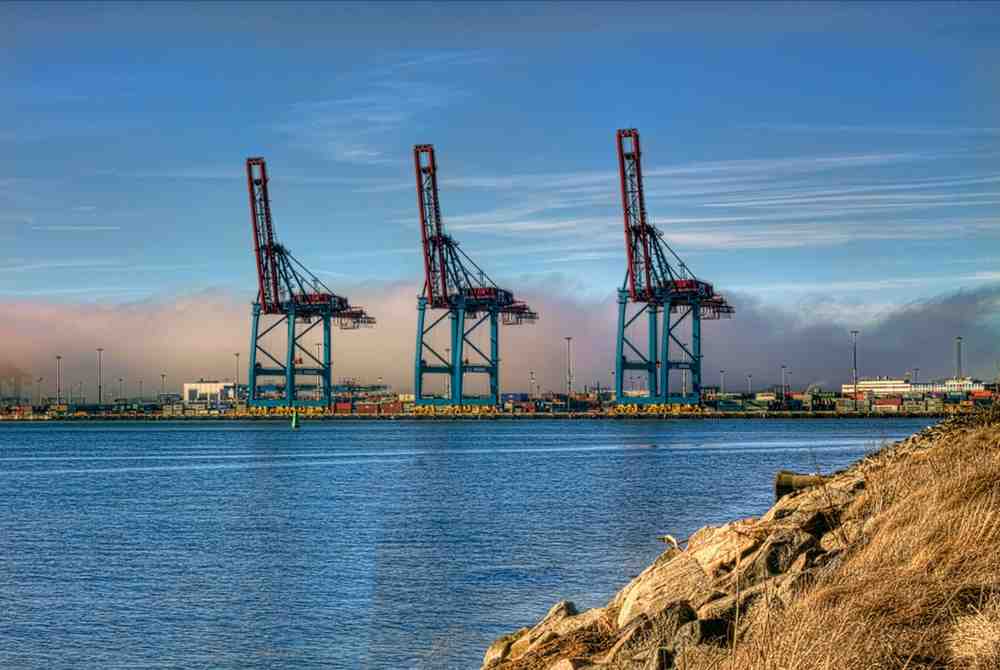
Maneuvering through the complex landscape of global logistics requires thoughtful decision-making, particularly when confronted with the choice between NVOCCs (Non-Vessel Operating Common Carriers) and Freight Forwarders. Each entity holds a vital role in the intricate tapestry of the supply chain, offering distinct advantages tailored to specific shipping needs. Therefore, let’s find the differentiating pointers leading to a decision between NVOCC VS Freight Forwarder.
In this blog, we delve into the fundamental differences between NVOCCs and Freight Forwarders, providing insights to empower businesses in making strategic choices aligned with their transportation requirements.
Furthermore, Artemus Transportation Solutions offers a preeminent ISF filing software, AMS filing software, & AES filing software indispensable for importers, exporters, NVOCCs, and freight forwarders. It ensures seamless compliance and operational efficiency in the intricate world of international trade.
Table Of Contents
In the dynamic realm of international shipping, Non-Vessel Operating Common Carriers (NVOCCs) occupy a distinctive position, playing a crucial role in facilitating the movement of goods across oceans. NVOCCs are logistics entities that specialize in ocean freight transportation without owning or operating their own vessels. Unlike traditional carriers, NVOCCs act as intermediaries, consolidating and managing shipments on behalf of shippers while leveraging their extensive network of carrier relationships.
The primary function of NVOCCs is to provide comprehensive and efficient ocean freight services without the burden of vessel ownership.
Here are five key pointers that highlight the crucial role of NVOCCs:
One of the primary functions of NVOCCs is to consolidate cargo from multiple shippers into full container loads. This process optimizes space on vessels, reduces costs, and enhances the overall efficiency of ocean freight transportation. Upon arrival at the destination, NVOCCs also handle the deconsolidation of containers, ensuring that goods reach their respective recipients promptly.
NVOCCs act as intermediaries between shippers and ocean carriers, leveraging their extensive network and negotiation skills to secure cargo space on vessels. Their expertise in booking and reservation processes ensures that shippers get the most favorable rates and terms, enhancing cost-effectiveness for businesses engaged in global trade.
Navigating the complex landscape of international shipping requires meticulous attention to documentation. NVOCCs excel in managing the necessary paperwork, including bills of lading, certificates of origin, and customs-related documents. This documentation expertise ensures compliance with international regulations and smooth customs clearance processes, minimizing the risk of delays and complications.
NVOCCs actively engage in assessing and mitigating risks associated with ocean freight. They provide valuable guidance to shippers on selecting appropriate insurance coverage for their shipments, helping safeguard against potential issues such as damages, delays, or unforeseen challenges. This risk management function adds a layer of security to the overall shipping process.
Effective communication is paramount in international shipping, involving multiple parties such as shippers, consignees, and ocean carriers. NVOCCs serve as facilitators, ensuring seamless communication and coordination throughout the shipping journey. By acting as a central point of contact, they enhance transparency and efficiency, addressing any concerns or inquiries promptly.
Related: How To Find HTS Code? Tips For HTS Code Identification
In the complex and interconnected world of international trade, Freight Forwarders play a pivotal role in facilitating the movement of goods across borders efficiently and seamlessly. These professionals serve as crucial intermediaries, orchestrating the logistics of shipping and ensuring that goods reach their destination in a timely and cost-effective manner.
Freight Forwarders are entities or individuals specialized in managing and coordinating the intricate process of shipping goods from one location to another. They act as intermediaries between shippers and carriers, navigating the complexities of transportation, customs regulations, and documentation.
Freight Forwarders serve as linchpins in the intricate web of international trade, providing invaluable services that streamline the movement of goods across borders. Their multifaceted role encompasses several key functions, each contributing to the efficiency and success of the global supply chain.
Freight Forwarders are master coordinators, orchestrating the entire logistics process. From determining the most efficient transportation routes to selecting appropriate modes of transport (air, sea, road, or rail), they meticulously plan each step to optimize the movement of goods, ensuring timely and cost-effective deliveries.
Navigating the complex world of international trade requires intricate knowledge of documentation and customs procedures. Freight Forwarders excel in preparing and managing the necessary paperwork, including bills of lading, commercial invoices, and customs declarations. Their expertise ensures compliance with regulations and a smooth passage through customs checkpoints.
Freight Forwarders leverage their extensive network of carrier relationships to negotiate favorable terms and secure cargo space on various modes of transport. Their ability to efficiently book cargo space ensures that businesses can ship their goods in a timely manner while minimizing costs through strategic negotiations.
Inherent risks accompany goods during transit, ranging from damages to delays. Freight Forwarders actively engage in risk assessment and mitigation, advising businesses on suitable insurance coverage to protect against potential losses. This risk management function adds a layer of security to the shipping process.
Issues can arise at any stage of the shipping process, from unexpected delays to customs challenges. Freight Forwarders act as problem solvers, swiftly addressing issues and ensuring a seamless flow of communication between all parties involved, including shippers, carriers, and customs authorities.
Related: HS Code VS HTS Code: 10 Differences You Need To Know
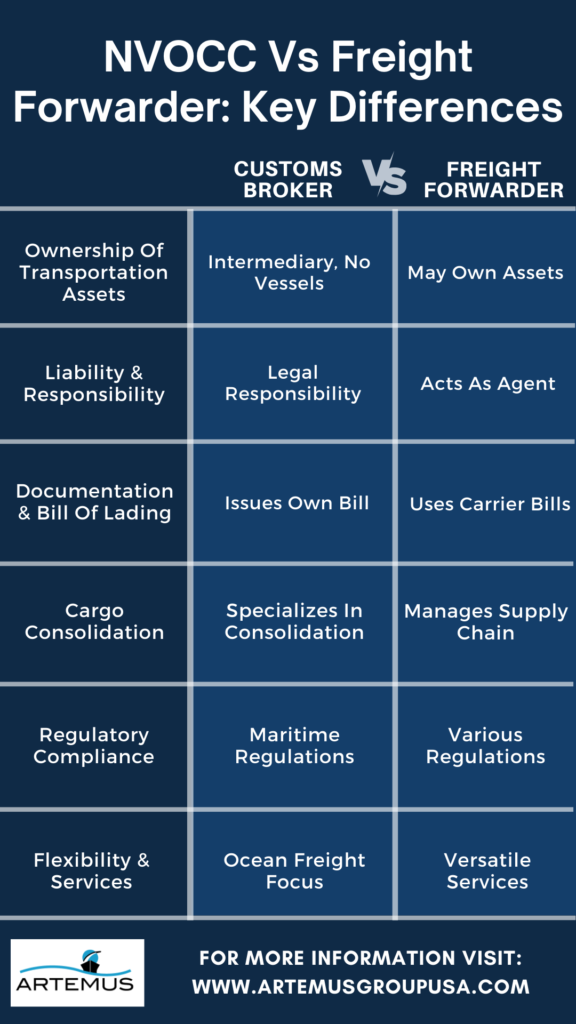
Non-Vessel Operating Common Carriers (NVOCC) and Freight Forwarders are two distinct entities in the shipping and logistics industry, each playing crucial roles in the movement of goods globally. While they share some similarities, there are key differences that set them apart. Understanding these differences is essential for businesses involved in international trade. Here are six key distinctions between NVOCCs and Freight Forwarders:
NVOCC: NVOCCs do not own vessels (ships) but act as intermediaries between shippers and ocean carriers. They consolidate shipments from multiple customers to achieve economies of scale and negotiate bulk shipping rates with carriers.
Freight Forwarder: Freight Forwarders may or may not own transportation assets. They arrange the entire logistics process, including transportation, and can work with various carriers, including airlines, shipping lines, and trucking companies.
NVOCC: NVOCCs issue their bills of lading and assume responsibility for the cargo from the point of origin to the final destination. They are legally responsible for the goods and handle documentation, customs clearance, and any claims or issues during transportation.
Freight Forwarder: Freight Forwarders typically act as agents and do not take legal responsibility for the cargo. They arrange transportation on behalf of the shipper and are not liable for any loss, damage, or issues during transit.
NVOCC: NVOCCs issue their bills of lading, which serve as a contract of carriage and a receipt for the goods. Shippers usually receive a negotiable or non-negotiable bill of lading from the NVOCC.
Freight Forwarder: Freight Forwarders may use bills of lading from carriers, and they often deal with non-negotiable or “straight” bills of lading. They facilitate documentation but don’t issue their bills of lading.
NVOCC: NVOCCs specialize in consolidating cargo from multiple shippers into a container. They optimize container space and offer more competitive rates for smaller shipments by combining them.
Freight Forwarder: Freight Forwarders may consolidate cargo but often focus on managing the entire supply chain, including storage, packing, and transportation, irrespective of containerization.
NVOCC: NVOCCs must comply with specific regulations and are often licensed by maritime authorities. They need to adhere to rules governing the issuance of bills of lading and other aspects of their operations.
Freight Forwarder: Freight Forwarders may need to comply with various regulations depending on the countries involved, but they are not necessarily subject to the same maritime regulations as NVOCCs.
NVOCC: NVOCCs primarily focus on ocean freight and containerized shipments. They provide cost-effective solutions for moving goods via sea routes and often collaborate with other service providers to offer end-to-end logistics solutions.
Freight Forwarder: Freight Forwarders offer a broader range of services, including air freight, trucking, customs brokerage, warehousing, and distribution. They are more versatile in meeting diverse logistics needs.
In the dynamic domain of global shipping, Non-Vessel Operating Common Carriers (NVOCCs) serve as linchpins, orchestrating the movement of goods across borders. This exploration delves into the distinctive advantages and limitations of NVOCCs, offering insights into their pivotal role in fostering cost efficiency, flexibility, and risk mitigation, while also addressing challenges inherent to their operational framework.
In the dynamic landscape of international shipping, Non-Vessel Operating Common Carriers (NVOCCs) emerge as indispensable partners, offering a spectrum of advantages that streamline the complexities of global trade.
NVOCCs leverage their expertise to negotiate competitive freight rates with carriers, allowing businesses to benefit from cost-effective shipping solutions. By consolidating shipments and optimizing container space, NVOCCs contribute to overall cost savings in the logistics chain.
NVOCCs offer shippers a range of flexible and diverse shipping options by coordinating with various shipping lines. This flexibility allows businesses to choose the most suitable routes and schedules that align with their specific shipping needs, contributing to a more tailored and efficient logistics strategy.
NVOCCs often have extensive networks and partnerships with carriers worldwide, providing businesses with access to a global shipping infrastructure. This broad reach facilitates seamless international trade and distribution.
NVOCCs excel in managing extensive documentation required for international shipping, including bills of lading, customs paperwork, and compliance with regulations. Their expertise ensures accurate and timely processing, reducing the administrative burden on shippers.
NVOCCs play a crucial role in navigating the complexities of international shipping regulations, customs procedures, and potential risks. Their experience and knowledge contribute to risk mitigation, ensuring a smoother and more secure shipping process for businesses.
While Non-Vessel Operating Common Carriers (NVOCCs) offer substantial benefits, it’s essential to navigate the seas of global trade with a clear understanding of the potential limitations that come with this logistics model.
NVOCCs do not own vessels, relying on carrier services. This lack of direct control over vessels can result in limited influence over schedules, potential delays, or disruptions caused by carrier-related issues.
The effectiveness of NVOCCs is dependent on their relationships with carriers or customs brokers and warehousing providers, to complete the shipping process. Any strain or disruption in these relationships can impact the quality of service and the ability to negotiate favorable terms for shippers.
Availability of containers can be a challenge for NVOCCs, especially during peak shipping seasons or in regions with high demand. NVOCCs may face congestion issues, leading to delays in cargo movement. This can affect the reliability of delivery timelines for businesses.
NVOCCs are susceptible to market fluctuations, including changes in fuel prices, currency exchange rates, and global economic conditions. These external factors can influence freight rates and overall shipping costs.
While some NVOCCs offer multimodal solutions, coordinating various transportation modes introduces complexities. Efficient integration of air, sea, rail, and road transport requires robust logistical capabilities and effective communication across the supply chain.
Related: Customs Compliance Software: Key Benefits & Top Suggestions
In the intricate world of global logistics, Freight Forwarders play a pivotal role in orchestrating the seamless movement of goods across borders. Understanding the advantages and limitations of these essential intermediaries is crucial for businesses navigating the complexities of international trade.
Freight Forwarders stand as indispensable facilitators of international trade, offering a myriad of advantages that streamline logistics, enhance efficiency, and ensure the seamless movement of goods across borders
Freight Forwarders provide end-to-end logistics solutions, covering everything from cargo booking and transportation to documentation, customs clearance, and last-mile delivery. This comprehensive approach ensures a holistic and efficient shipping process for businesses.
Leveraging their in-depth knowledge of international regulations, Freight Forwarders excel in handling complex documentation required for cross-border shipments. Their expertise in customs clearance processes ensures compliance and minimizes the risk of delays or complications at borders.
Freight Forwarders boast extensive networks of carriers, customs brokers, and other logistics partners worldwide. This global reach enables them to negotiate favorable rates, secure reliable transportation options, and navigate diverse regulatory landscapes seamlessly.
Freight Forwarders actively assess and mitigate risks associated with the shipping process. They offer valuable guidance on selecting appropriate insurance coverage, helping businesses protect their cargo against potential damages, losses, or unforeseen challenges during transit.
Freight Forwarders are adept at adapting to the evolving needs of businesses. Their flexibility allows them to tailor shipping solutions based on factors such as cargo type, urgency, and budget, providing customized services that meet the unique requirements of each shipment.
While playing a pivotal role in the complex tapestry of international trade, Freight Forwarders, like any logistical model, have nuanced limitations that businesses must navigate to ensure a smooth and efficient global shipping process.
Freight Forwarders often depend on third-party carriers for transportation services. Changes in carrier availability, schedules, or service quality can impact the overall reliability of the shipping process.
Coordinating a range of services, including documentation, customs clearance, and transportation, can be complex. Managing these diverse services efficiently requires a high level of expertise and coordination, and challenges may arise in optimizing the entire logistics chain.
While Freight Forwarders offer valuable services, there are associated costs. Businesses need to weigh the benefits of outsourcing logistics services against the expenses incurred, considering factors such as transportation fees, customs duties, and additional service charges.
Effective communication is paramount in global logistics, involving multiple stakeholders. Challenges in communication and coordination, especially in complex supply chains, may arise and require proactive management to ensure smooth operations.
External factors, such as natural disasters, geopolitical events, or changes in regulations, can disrupt logistics services. Freight Forwarders need to navigate these challenges swiftly to minimize the impact on shipments and maintain reliable service.
Related: Where Can I Buy A Customs Bond? Understand Your Options
Choosing between NVOCC (Non-Vessel Operating Common Carrier) and Freight Forwarders depends on various factors that cater to specific shipping needs. Both play crucial roles in the logistics industry, but their differences make them suitable for different situations.
Related: ISF Filing: A Compliance-Related Guide & Software Solution
An NVOCC (Non-Vessel Operating Common Carrier) agency plays a pivotal role in facilitating smooth international trade by managing the complex process of import documentation and coordination.
Unlike traditional shipping lines, an NVOCC does not operate its own vessels but acts as a carrier by issuing its own bills of lading and taking responsibility for cargo from the point of origin to the final destination.
This necessitates meticulous attention to import documentation and coordination to ensure compliance with international regulations and smooth delivery.
NVOCCs are responsible for ensuring that all required import documentation is accurate and timely. The essential documents typically include:
The NVOCC agency must also coordinate several crucial steps in the import process to ensure the timely arrival of goods at the destination port:
By managing the import documentation and coordination process effectively, an NVOCC agency ensures a seamless experience for importers, minimizing delays and ensuring compliance with all relevant international trade regulations.
This level of service is particularly valuable in today’s fast-paced, globalized economy, where efficiency and accuracy are critical to maintaining a competitive edge.
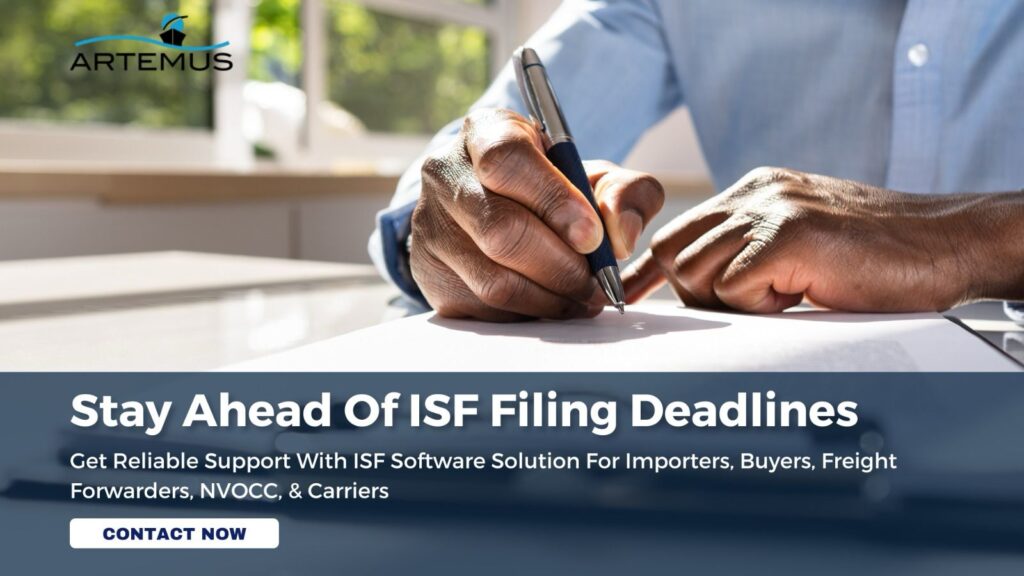
Artemus stands as the top ISF filing software, serving importers, NVOCCs, and freight forwarders with efficiency. Its user-friendly interface ensures seamless compliance with U.S. Customs and Border Protection regulations for importers, while NVOCCs benefit from its capacity to handle large shipping volumes.
The software’s versatility is particularly valuable to freight forwarders, offering a comprehensive solution for customs documentation and adapting to various transportation modes. With its streamlined design, Artemus is the preferred choice for simplifying operations and ensuring regulatory adherence throughout the import supply chain.
Related: ISF 5: Meaning, Compliance Requirements, & Best Practices
A freight forwarder can also function as an NVOCC (Non-Vessel Operating Common Carrier).
The role of NVOCC (Non-Vessel Operating Common Carrier) is to consolidate and manage shipments on behalf of shippers without owning vessels, providing a cost-effective and streamlined logistics solution.
Yes, an NVOCC (Non-Vessel Operating Common Carrier) can issue its own ocean bill of lading.
Yes, a freight forwarder can be an NVOCC (Non-Vessel Operating Common Carrier) if they assume responsibility for booking cargo, issuing their own bills of lading, and arranging ocean freight transport without operating their own vessels.
The main difference is that freight forwarders arrange logistics and transportation for clients but do not issue bills of lading, whereas an NVOCC acts as a carrier by issuing its own bills of lading and taking responsibility for the cargo, even though it doesn’t own ships.
An example of an NVOCC is Expeditors International, a global logistics provider that issues its own bills of lading and manages cargo shipments, even though it does not own ships.
The two basic types of freight forwarders are independent forwarders (who operate as third-party logistics providers) and carrier-affiliated forwarders (who work closely with shipping carriers or airlines).
Yes, many NVOCCs own containers or lease them to offer comprehensive shipping solutions. They may also arrange the use of containers from other carriers as needed.
LCL stands for Less than Container Load, which refers to shipping cargo that does not fill an entire container. The cargo is consolidated with other shipments in the same container to optimize space and reduce costs.
An NVOCC (Non-Vessel Operating Common Carrier) owns or leases containers, issues bills of lading, and takes responsibility for cargo, while a freight forwarder (FF) arranges transport but does not assume liability for the cargo in the same way an NVOCC does.
An NVOCC is a type of logistics company that does not operate vessels but assumes the role of a carrier by issuing its own bills of lading and arranging for the transport of goods via ocean freight.
BCO stands for Beneficial Cargo Owner, which refers to the entity that owns the cargo being shipped, typically the manufacturer, importer, or exporter who holds the ownership and liability for the goods.
An NVOCC is a company that issues its own bills of lading without owning vessels, while an MLO (Main Line Operator) is a traditional shipping line that owns vessels and directly manages ocean freight transport.
An NVOCC arranges and manages cargo shipping without operating its own vessels, whereas a shipping line (carrier) owns and operates the ships that transport the cargo, often with a direct relationship to the vessels and schedules.
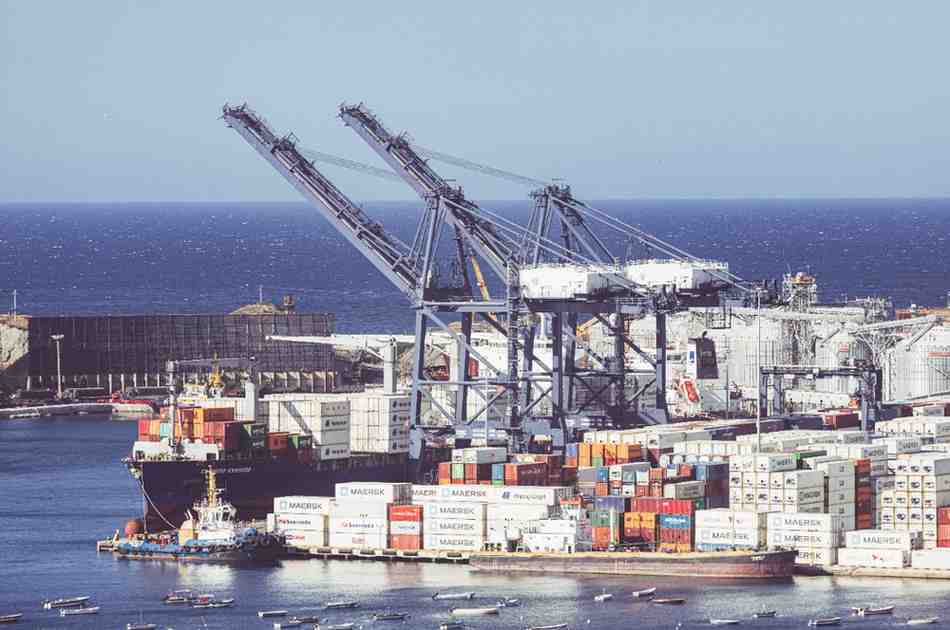
In the complex international shipping landscape, the choice between NVOCCs and Freight Forwarders depends on unique business needs. NVOCCs offer control and global reach, while Freight Forwarders provide versatility and tailored solutions. Understanding the strengths of each empowers businesses to make strategic shipping decisions, ensuring an efficient and streamlined logistics experience.

Importing goods for resale in the USA presents a lucrative business opportunity, but navigating the complexities of U.S. customs regulations,
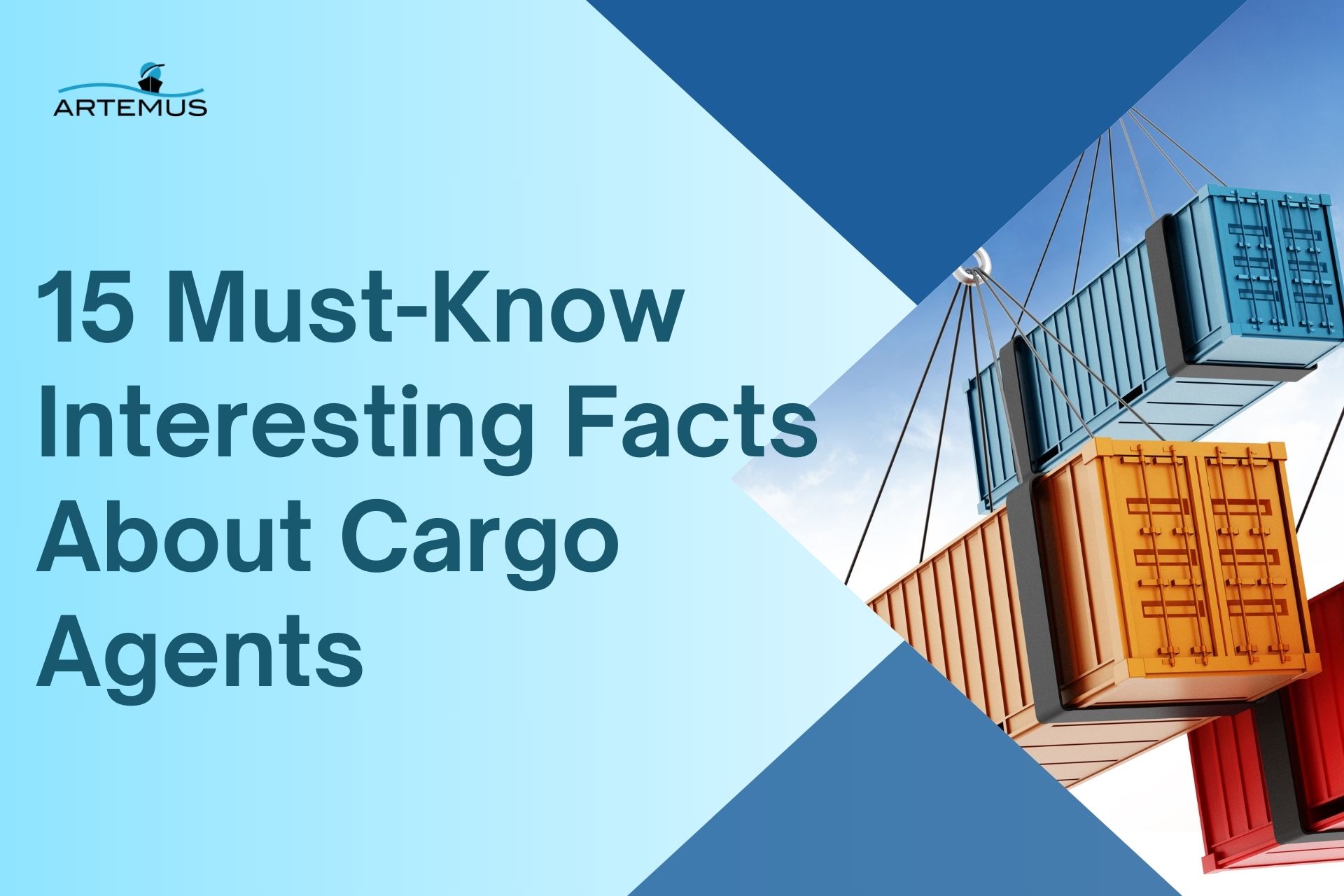
Cargo agents are the backbone of the global logistics and shipping industries, managing the complex web of tasks that ensure
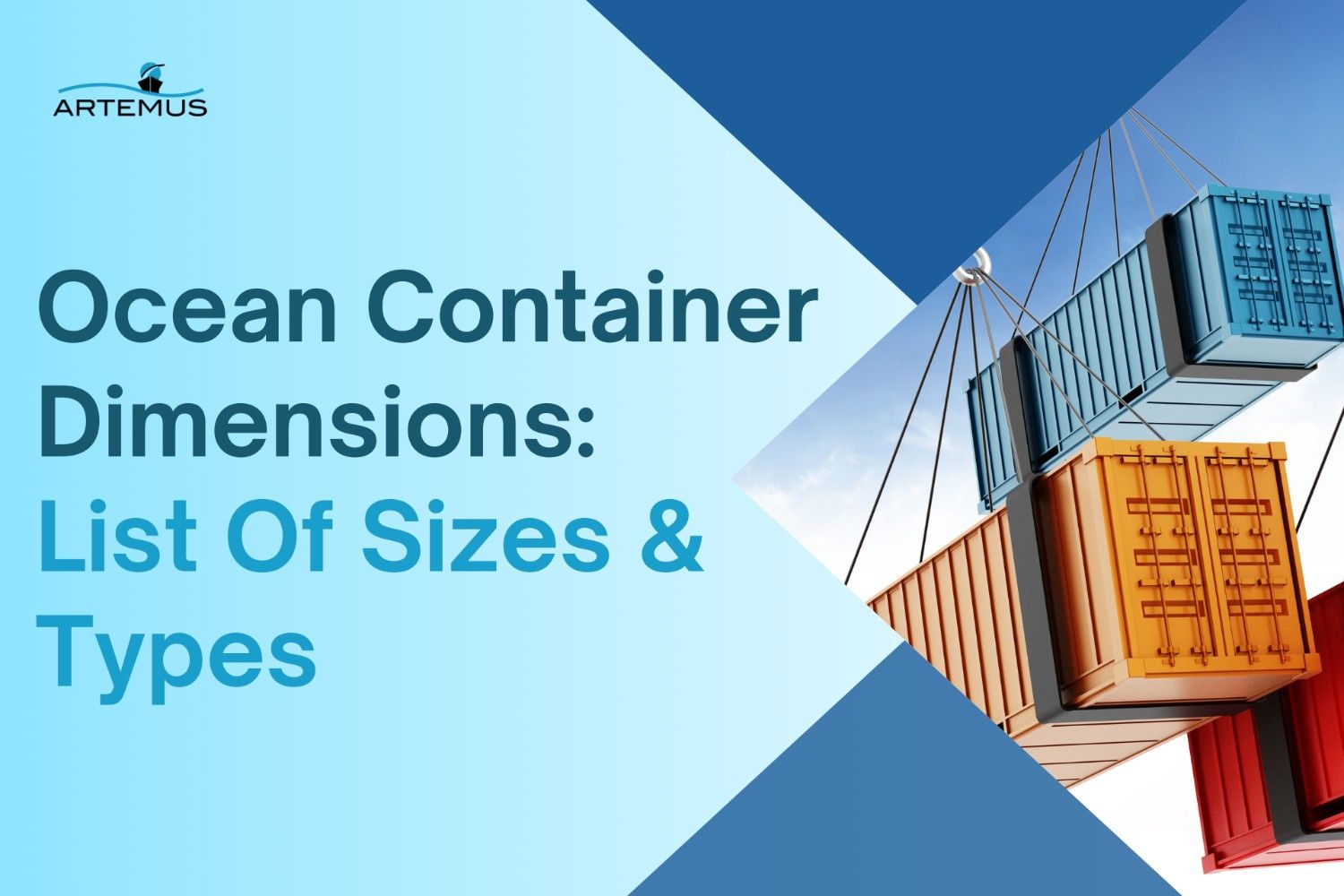
Ocean container dimensions are essential for efficient global shipping, ensuring that goods are transported safely and cost-effectively. Understanding container sizes,
Get In Touch
Artemus’ Software Solutions for ISF, AMS, Japan AFR, eManifest Canada, & Panama B2B filings.